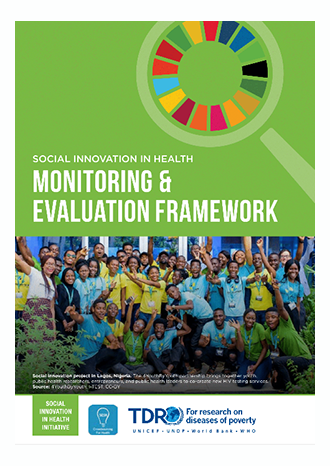The rapid growth of social innovation in practice and research has contributed to a wide range of important new health-related devices and services. However, scaling up their use, iteratively improving the approach, and adapting the innovation for other settings all depend on high-quality monitoring and evaluation.
The Social Innovation in Health Initiative (SIHI) is a network of dedicated individuals and institutions sharing a common goal to advance social innovation in health. Through research, capacity building and advocacy, SIHI aims to accelerate progress toward universal health coverage and meet the Sustainable Development Goals (SDGs). Since 2014, SIHI has identified and studied more than 40 community-based social innovations across 17 countries that are transforming health care delivery to improve access so no one is left behind.
The COVID-19 pandemic has highlighted the importance of community-led social innovations that overcome barriers to delivering health services and engage communities to identify and implement solutions. We have seen several innovators step up to the pandemic challenge and make a difference.
Take Noora Health for example, a social innovation in Bangladesh and India that empowers patients’ families as caregivers. To comply with social-distancing measures and reduce transmissions, Noora Health has developed tele-training materials for families caring for loved ones battling COVID-19 at home.

Such brilliant social innovations are developed every day, yet few are sustained beyond a year or so. Evidence of what works and what doesn’t is often lacking to guide innovators and their stakeholders. Research is needed to help them better understand the various factors that make their innovations effective, sustainable and replicated or scaled up.
Stakeholders and experts convened by SIHI and TDR have highlighted the need to develop research tools to help embed research in social innovations and empower all players to actively engage in them. In response, SIHI and TDR have developed a number of innovative tools:
- the Crowdsourcing in health and health research practical guide to facilitate inclusive community engagement in research; and
- research training modules on social innovation in health and on community engagement. These modules will help familiarize researchers with social innovation and community engagement approaches and will also help innovators and communities become familiar with research and engage in studies.
The Social Innovation in Health Monitoring & Evaluation Framework is an additional research tool to guide researchers, innovators, community members, decision-makers and other social innovation actors on how to carefully monitor all steps of the social innovation development process and evaluate their effectiveness, sustainability and scalability. This framework will complement the TDR MOOC on IR and other TDR IR tools.
“What if social innovation could be embedded in research and research embedded in social innovation to make solutions inclusive, effective, affordable and sustainable? We hope that this framework will help realize this vision,” said Dr Beatrice Halpaap, who leads TDR’s participation in the Social Innovation in Health Initiative.
A webinar on the M&E framework will be held on 5 May at 2pm CET. To receive details and registration information, contact sesh@seshglobal.org.
For more information, please contact Dr Beatrice Halpaap
SIHI is supported by TDR, and additional funding is provided by
the Swedish International Development Cooperation Agency (Sida).
 |  |

